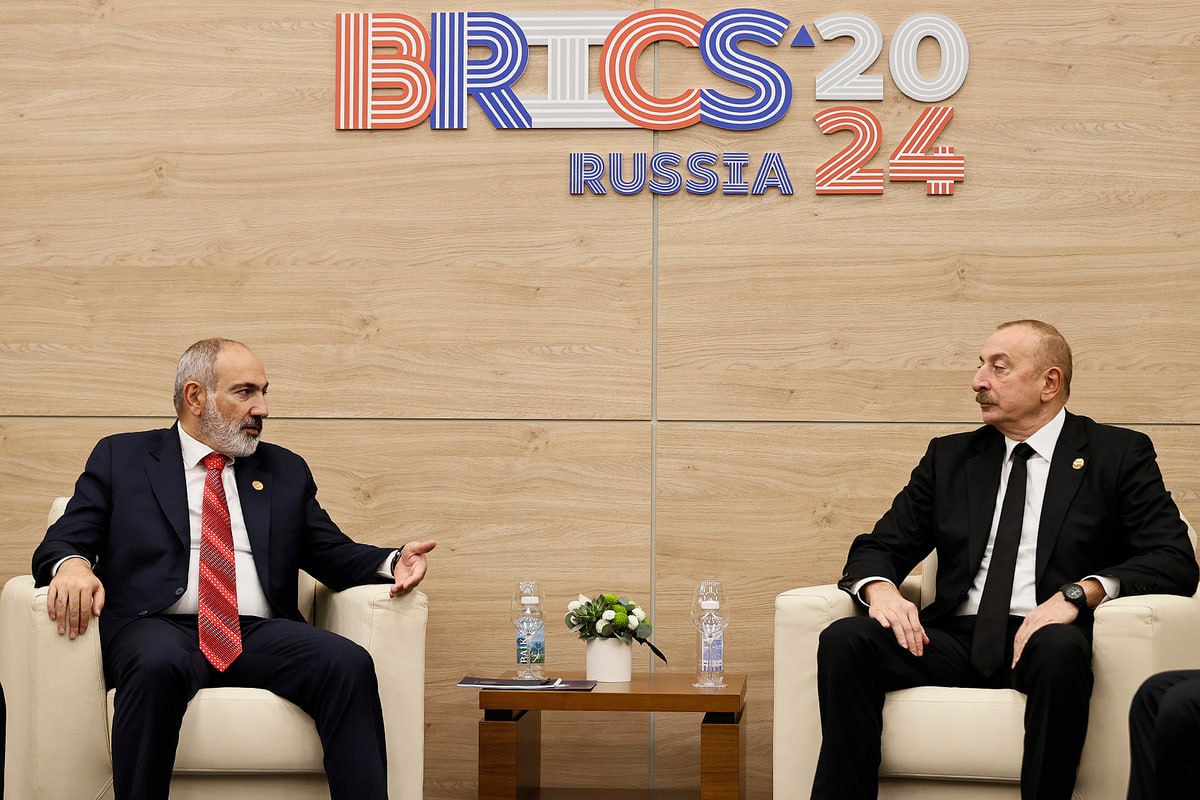
Aliyev and Pashinyan at the BRICS summit
The footage capturing the sincere interaction between Azerbaijani President Ilham Aliyev and Armenian Prime Minister Nikol Pashinyan at the 16th BRICS summit in Kazan continues to be actively discussed.
During the mentioned meeting, the parties discussed advancing the bilateral peace agenda, including a peace agreement, delimitation and demarcation of borders, as well as other issues of mutual interest. The foreign ministers of both countries were tasked with continuing bilateral negotiations aimed at quickly concluding and signing an agreement on peace and interstate relations. Pashinyan and Aliyev sat next to each other at the summit, and cameras captured moments when they were seen smiling and conversing.
In an interview with the Turan news agency, political analyst Zardusht Alizade shared his thoughts on this interaction and the prospects for normalizing relations between Armenia and Azerbaijan.
- EU leaders halt Georgia’s accession process over government policies – Pawel Herczynski
- 50/50: How referendum results will shape Moldova’s path to the EU
- The Azerbaijani scenario for Georgia: a perspective from Baku
“It is time to transition from a mindset of war to a mindset of peace.”
The political analyst believes that the genuine and comfortable communication between the leaders of the two countries, reflected in the footage, may indicate the beginning of a warming phase in the conflict.
“From 2019 to 2024, relations between the leaders of Azerbaijan and Armenia were extremely tense. For the first time, I saw on screen that this tension had disappeared.
The speeches of the leaders at the BRICS summit also demonstrated that neither the Armenian Prime Minister nor the Azerbaijani President is interested in continuing the conflict. On the contrary, Pashinyan spoke about the possibilities for resolving relations between the two countries, delimitation, opening the Zangezur road, and restoring relations, among other things. The President of Azerbaijan discussed the country’s international activities, particularly its participation in the Non-Aligned Movement, BRICS, and COP29. This is encouraging. It also shows that the heads of state are sending a message to both their own people and to the neighboring nation that the conflict is now behind us, and that problems can be solved through practical discussions.”
According to Zardusht Alizade, it is time for radical changes in the sentiments of both societies.
“It is one thing when people live in a war coordination system, and another when they are in a peace coordination system. It seems to me that societies must end the mindset of war and transition to a mindset of peace. To achieve peace, there must be contacts not only at the level of heads of state but also at the level of ordinary citizens; relationships should be built on mutual interests, including financial interests,” he says.
On the invitation to COP29 and the condition for the return of “prisoners of war”
Azerbaijan has invited the Armenian side to participate in COP29. According to some Armenian sources, Armenian Foreign Minister Ararat Mirzoyan stated that they could attend the event in exchange for the return of the so-called Armenian “prisoners of war” (a term used in Armenia for members of the former separatist regime in Karabakh who are detained in Baku). However, this information has not been officially confirmed.
The political analyst believes that participation in global events such as COP29 should be in the interest of each country.
“Participation in COP29 is a success for every state, every organization, and every scientist engaged in environmental protection. It is an opportunity to communicate with colleagues, share experiences, create joint projects, invest, and find funding. If it were simple, the UN would not hold such events.
Such an important event is being held nearby. If Armenia does not take advantage of this opportunity, it will be a sign of their mistaken position.
As for the release of those they call ‘prisoners of war,’ some of them are indeed war criminals, while others are victims of circumstances,” says Zardusht Alizade.
On the peace treaty with the condition of changes to the Armenian constitution
The political analyst is confident that “it is pointless to insist on changing the Armenian constitution,” which Azerbaijan has proposed as a precondition for signing a peace treaty. In his opinion, “what is written in ink on paper is not a guarantee of security.
” He explains: “For example, if we were to ask any Azerbaijani citizen under what conditions they believe peace should be established with Armenia, ninety percent would respond that the constitution should be changed, as it poses a danger to us. So I want to ask, brother, do you know world history? When and where has something written in ink on paper guaranteed security? Never, nowhere!
After the signing of the Munich Agreement in 1939, British Prime Minister Chamberlain returned to his country, waving the agreement in his hand, and told the people he had brought them peace. A year later, Germany bombed London.
In the same year, a non-aggression pact was signed between the USSR and Germany. In 1941, Germany attacked the USSR.
In Budapest in 1994, the US, UK, and Russia provided security guarantees to Ukraine. Russia was a guarantor of the sovereignty and security of this country. Now, nearly three years into the war between Russia and Ukraine, it is evident that such documents are meaningless.
In the Declaration of Independence of Armenia, it was stated that Armenia and Nagorno-Karabakh should unite to restore historical justice. Did they unite? No!
Above all, the state itself must be strong and able to ensure its own security. Whatever is written in the Armenian constitution, if the Azerbaijani state and army are strong, no government or parliament in Armenia will allow their country to attack us.
From this perspective, changing the Armenian constitution is more necessary for Armenia than for us. They should be more interested in establishing friendly relations with us. Therefore, this issue should not be a fixation. If they change their constitution in 2026, good; if not, it is no concern of ours.
The question remains whether Azerbaijan will sign a peace treaty without changes to the Armenian constitution. In my opinion, if there is a peace treaty, if borders open, and if economic and trade relations begin, significant changes will also occur in Turkish-Armenian relations, resulting in hostility towards us and the Turks becoming irrelevant in Armenian society.”



